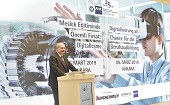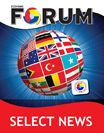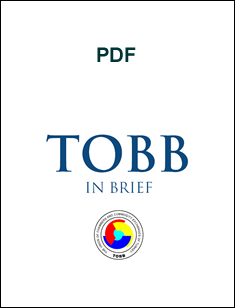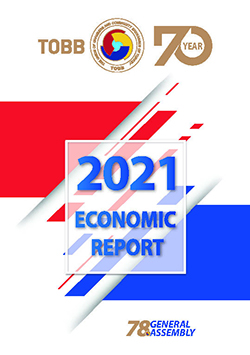German-Turkish Chamber of Commerce and Industry Ankara Office opened

06.03.2019 / Ankara
German-Turkish Chamber Commerce and Industry Ankara Office was opened to service by the Industry and Technology Minister Mustafa Varank, the Union Chambers and Commodity Exchanges of Turkey (TOBB) Chambers of Commerce Council President Gürsel Baran, Germany Trade and Industry Association CEO Dr. Martin Wansleben and German-Turkish Chamber of Commerce and Industry Board Chairman Markus C. Slevogt.
Following the opening of the office, an Economy Meeting was held in regards to evaluating vocational training and digital developments in this field as the key to being among the strongest economies.
TOBB Chambers of Commerce Council President Gürsel Baran, in his speech at the meeting, noted Turkey and Germany are Europe's two major economic powers, saying, “Our friendship and our partnership is deep-rooted. Germany is the 4th largest economy in the world. It is the economic superpower of Europe. It is the largest economy in Europe. It is a production and technology base. It is the most successful example of Europe and even the world in terms imparting skills to young people and their employment.”
Pointing out that Germany is Turkey's most important trading partner Baran said, “Our trade volume has passed approximately 30 billion Euros. Germany is also the most important investing country in Turkey. Currently, 7,110 German companies are operating in Turkey. Between the years 2002-2018 the amount of foreign direct investment coming to Turkey from Germany was close to 9 billion Euros. In the same period, foreign direct investment was around 2 billion Euros from Turkey to Germany.”
Baran reported that approximately 90,000 of German-born Turkish entrepreneurs are operating in 50 different sectors in Germany and have provided over 400,000 jobs.”
Stating that Germany is among Turkey's most important customers in tourism, Baran stressed that, “In the region spanning from China to Germany, Turkey has the largest industrial production capacity and exports the most manufactured goods. That Turkey has become integrated into Europe during this period, is important for Turkey, Germany, as well as all of Europe. The preservation of this is in all of our best interests.”
Baran stated that in all the achievements in Turkey-European Union relations so far, the impact of Germany's visionary approach has been instrumental, and that the support of the German Government and the German business world is a very important component in this.
Stressing that Turkey-EU accession process negotiations should continue, Baran said, “The European Union is Turkey's most important trading partner. Turkey's exports in 2017 were made 45% to the European Union. 38% of its imports were from the EU. Trade in goods between Turkey and the European Union is about 150 billion Euros. The modernization of the Customs Union will add new momentum to Turkish-German economic relations. The inclusion of services, agricultural products and public procurement within the scope of the Customs Union will further advance the existing economic integration. Visas waste time and resources for business people. It also harms efforts to develop bilateral relations. Ongoing visa liberalization negotiations between the European Union and Turkey should be completed as soon as possible. Refugees and especially the issue of Syrian refugees is one of the common issues for Turkey and the EU. Turkey is hosting over 3.5 million Syrian refugees. Germany's success in the integration of migrants is not only an example of success in Europe, but also in the world. At the same time, Turkey contributes greatly to the European Union's efforts against illegal immigration. Those who put their trust in and invested in Turkey yesterday have profited. Those investing in Turkey today will be tomorrow's winners. Continue to rely on Turkey. Let us continue to increase our cooperation and trade.”
- Minister Varank
Industry and Technology Minister Mustafa Varank also stated that chambers play an important role in the development of trade and investment between the two countries.
Pointing out that Germany, with its 36 billion USD trade volume, is Turkey's largest trading partner and largest export market, Varank said the country also ranks third in imports.
Varank reported that the reforms implemented in recent years to improve the investment environment, have borne results in the international arena; efforts in which TOBB was also involved in have resulted in Turkey rising in ranks of the 'Doing Business' index, rising 17 ranks to 43rd among 190 countries.
Stating that the theme of today's economic meeting, “Important Opportunity in Vocational Training: Digitalization,” is a very apt choice, Varank stated that it is their desire to be prepared for the risks of the period as well as benefiting from the opportunities in the best way. Underlining the importance of the training given in practice, Varank said:
“We have implemented the Protocol on Vocational Education Cooperation between ISO, ITO, ITU, the Ministry of National Education and our Ministry 2 months ago, in other words, we have brought the education, industry and university together for a singular purpose in the coordination of the Ministry of National Education. We will support and prepare the qualified human resources needed by the sector. This cooperation will prepare our young people much better for business life and encourage them to be more productive.”
Varank stated that the “300 Technical Colleges to 300 OIZs” cooperation protocol was signed together with the Ministry of National Education to increase the quality of vocational-technical education; that by opening Anatolian High Schools providing vocational and technical education in OIZs, improving the quality of education. Stating that in this context, curriculum has been enriched with topics such as information technology, block chain, cloud computing, artificial intelligence, big data, cyber security, Varank, training is underway at 39 Technical Colleges in OIZs. Varank stated that the government provided support to the Vocational High Schools in the OIZs on a per-student basis last year and that YÖK has provided 8 million TRY in support to 8 Vocational High Schools providing education in OIZs.
-Dr. Markus C. Slevogt
Chairman of the German-Turkish Chamber of Commerce and Industry Markus C. Slevogt said, “Education should be encouraged, especially for innovation and technological development. AHK Turkey will play a key role in transferring Germany's dual vocational training experience, knowledge and systems. Youth in command of the business process theory and practice are professionals who are sought by companies and who contribute to the development of the economy as a whole.”
-Dr. Martin Wansleben
CEO of the German Chambers of Commerce and Industry Martin Wansleb said, “Turkey has maintained close and multilateral relationship with Germany in the past. Both sides are aware of the importance of their partnership in the economic sphere and are absolutely committed to overcoming the current challenges, such as commercial barriers. There is a great potential for the development of German and Turkish economic relations, and this potential is not limited to encouraging vocational education. However, German companies, to engage in new investment and long-term commitment in Turkey's market require a certain framework of conditions. It is important for this reason to maintain an open dialogue on how to improve the investment environment in order to benefit fully from the potential of the Turkish-German economic relations in the coming years.”
- “Coding taught in ASO kindergarten”
Ankara Chamber of Industry (ASO) President Nurettin Özdebir reported that 20% of the high-tech industrial products manufactured in Turkey are produced in Ankara.
Özdebir stated that Ankara's exports last year reached 7.6 billion USD, 20% of which is high-tech products.
Özdebir, speaking about the vocational training projects they carry out in Ankara for their qualified human resources needs, said: “ASO has 164 students in our kindergarten and we are these children coding. We are raising awareness. We have two vocational high school, apprenticeship training, special workshops which provide training as necessary. We’ve built on the German vocational education model and aim to address the industry’s need for qualified personnel.”
Your message has been sent
Thank you |




